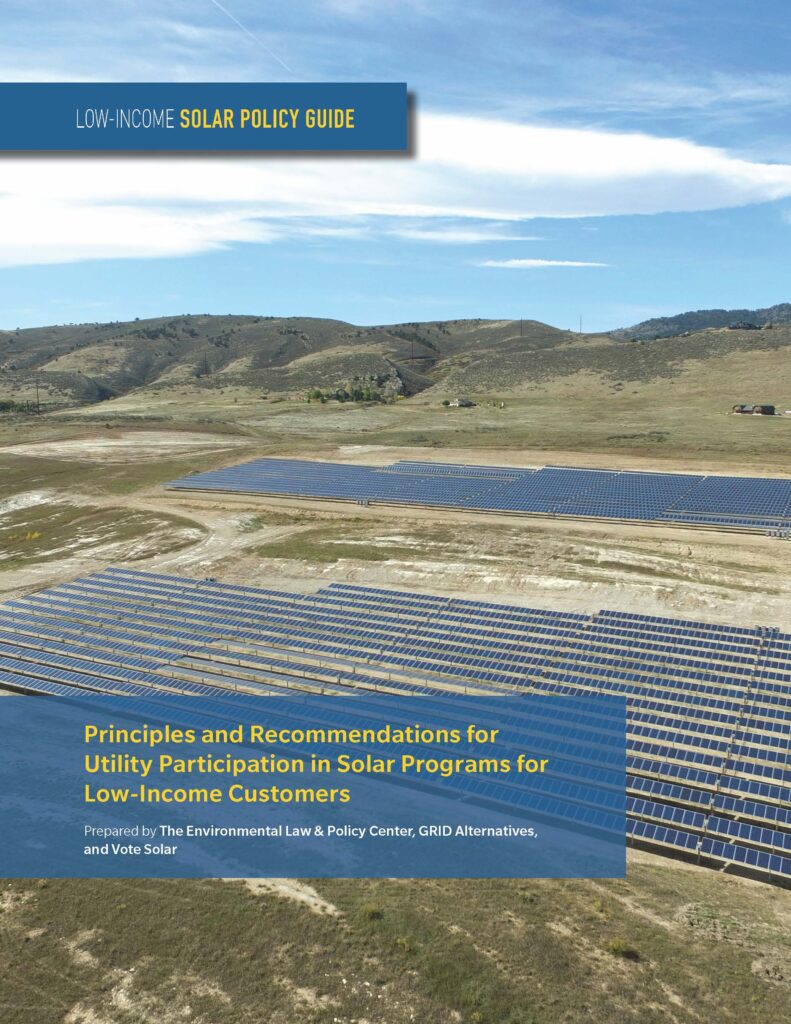New Guide for Utility Participation in Solar Programs for Low-Income Customers
Report released by GRID Alternatives, Vote Solar and Environmental Law & Policy Center
Low-income solar rights advocates released Principles and Recommendations for Utility Participation in Solar Programs for Low-Income Customers today as part of an ongoing campaign to ensure that local, clean, affordable solar energy is available to everyone, regardless of their income level or housing type.
“Clean energy should be for everyone, and with a few strategic shifts, it can be,” said report co-author MeLena Hessel, a senior policy advocate with the Environmental Law & Policy Center. “Too often, low-income communities receive the brunt of pollution and the effects of climate change, but are left out of the solutions. This report lays out realistic, common-sense guidelines for utilities to share those solutions – and the clean energy future – with all.”
In considering the roles utilities can and should play in making solar available for low-income households and underserved communities, the paper outlines three interrelated sets of guidelines and considerations for policy-makers and regulators:
- Opportunities for Utility Facilitation of Low-Income Solar
- Considerations for Utility Development and Ownership of Solar for Low-Income Communities
- Guidelines for Successful Low-Income Solar Programs
“Access to distributed solar offers tremendous benefit to low-income families, including cost savings, increased resiliency to environmental and climate impacts, and localized economic and job benefits. However, barriers to solar access persist, even in mature solar markets” said Tom Figel, Director of Community Solar, GRID Alternatives. “Utilities can play a critical role in addressing specific market barriers by addressing technical, financial and operational barriers and working in partnership with third parties and communities.”
Utilities are in a unique position to directly address some of the barriers to low-income solar deployment and ownership. However, special care must be taken to ensure utility-owned projects are designed to meet the needs of low-income households and underserved communities.
“Utility owned projects must provide immediate tangible economic benefits for low-income participants,” said Melanie Santiago-Mosier, Managing Director of Access & Equity at Vote Solar. “That means addressing financial barriers to participation and fully compensating low-income solar projects for the services and benefits they provide.”
This new guide is featured on the Low-Income Solar Policy Guide, a tool for policymakers, community leaders and others working on solar access at the federal, state and local levels.
###
GRID Alternatives
GRID Alternatives is a leading voice in renewable energy access, driving policies at the state and local level that support solar and clean mobility access and job training for underserved communities. GRID’s policy leadership, with equity as the driving principle, has brought renewable energy’s concrete benefits, including electric bill savings, resilience, access to jobs and reduced pollution,to underserved communities nationwide. For more information, visit gridalternatives.org.
The Environmental Law & Policy Center
The Environmental Law & Policy Center is the Midwest’s leading public interest environmental legal advocacy organization. We develop strategic campaigns to protect natural resources and improve environmental quality across the region. Our multidisciplinary staff employs teamwork approaches using legal, economic, and public policy tools to produce successes that improve our environment and economy. For more information, visit elpc.org.
Vote Solar
Vote Solar’s mission is to make solar a mainstream energy resource across the U.S. Since 2002, Vote Solar has been working to lower solar costs and expand solar access. A 501(c)3 non-profit organization, Vote Solar advocates for state policies and programs needed to repower our electric grid with clean energy. Vote Solar works to remove regulatory barriers and implement key policies needed to bring solar to scale. For more information, visit VoteSolar.org


